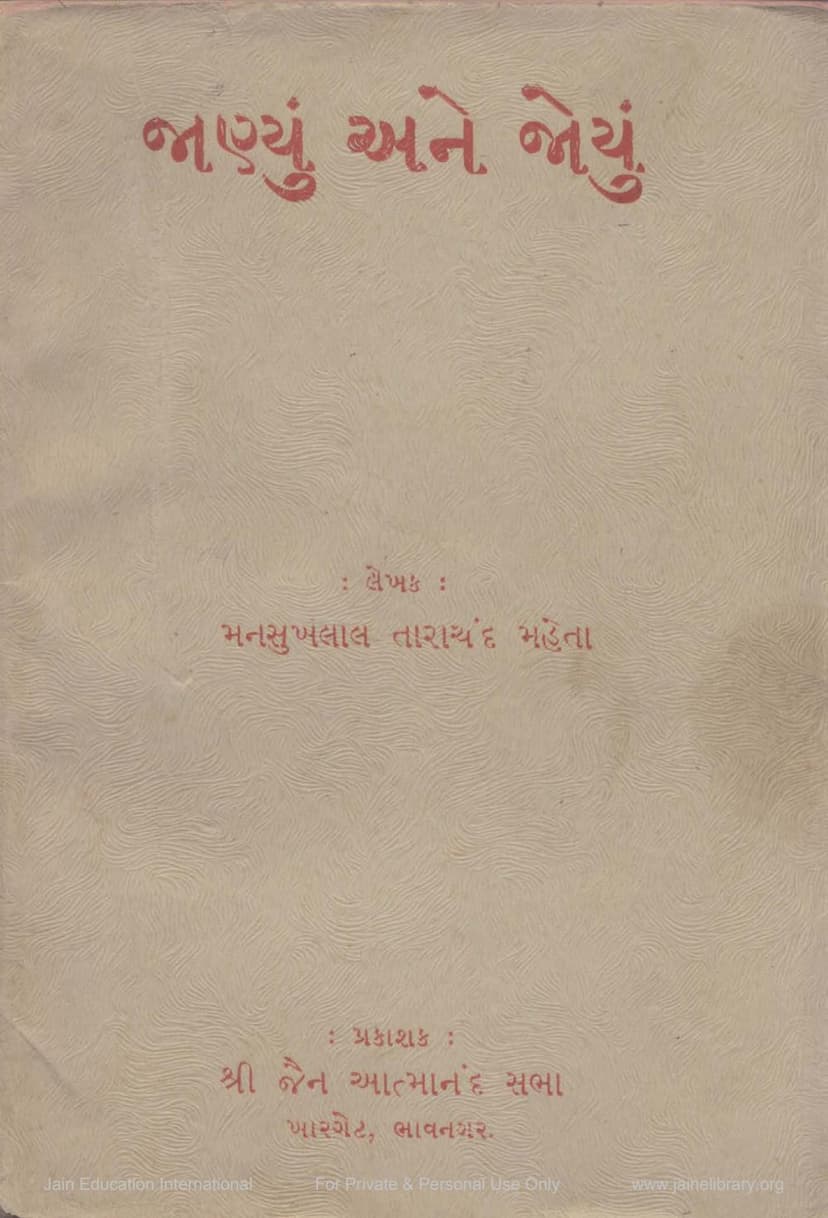Janyu Ane Joyu
Added to library: September 2, 2025

Summary
Certainly! Here's a comprehensive summary of the Jain text "Janyu ane Joyu" by Mansukhlal T. Mehta, based on the provided pages:
Book Title: Janyu ane Joyu (Known and Seen) Author: Mansukhlal T. Mehta Publisher: Shri Jain Atmanand Sabha, Khargate, Bhavnagar
Overall Theme and Purpose: "Janyu ane Joyu" is a collection of essays and observations by Mansukhlal T. Mehta, reflecting on various aspects of life, spirituality, and social conduct. The title itself, "Known and Seen," suggests that the book is based on the author's personal experiences, insights, and reflections on events he has witnessed and knowledge he has acquired throughout his life. The underlying aim is to draw moral and spiritual lessons from everyday occurrences and to guide readers towards a more meaningful and virtuous existence, aligning with Jain principles.
Key Themes and Content:
The book is structured as a compilation of distinct pieces, each exploring a different topic. Based on the table of contents and the provided snippets, the following are the prominent themes and subjects covered:
- Spiritual Growth and Moksha (Liberation): The initial pages emphasize that the root of liberation lies in the mind's ability to learn from experience and to internalize thoughts through contemplation. Just as a craftsman refines their skills through practice, the mind can achieve spiritual liberation through consistent effort and self-awareness, leading to a natural and inherent character.
- Wisdom and Universal Acceptance: Quoting James Allen, the text highlights the qualities of a truly wise and good person who sees good in all, understands the diversity of human nature, and refrains from hatred, condemnation, and prejudice. Enlightenment comes from recognizing purity, love, and compassion as manifestations of light, while impurity and negative emotions stem from darkness.
- Natural Healing (Kudrati Upchar): The author shares his personal experience with natural healing methods, particularly referencing Mahatma Gandhi's work at the Nisargopchar Ashram in Uruli Kanchan. He critiques the over-reliance on medicine and injections, advocating for natural remedies as a more effective way to address the root causes of illness.
- The Significance of Festivals and Rituals (Samvatsari): The essay on "Samvatsari ni Karun Kahani" (A Pathetic Tale of Samvatsari) delves into the emotional and communal aspects of this important Jain observance, highlighting the potential for misunderstandings and the importance of maintaining harmony and forgiveness.
- Art, Spirituality, and Life's Philosophy: The author explores the intersection of art and spirituality, using the example of a painting of Lord Mahavir to illustrate the power of compassion and love. He also reflects on the true meaning of living a life, emphasizing that it's not just about existence but about living with purpose and wisdom, often gained through adversity.
- Co-education and Societal Norms: The essay on "Sahashikshan" (Co-education) discusses the author's concerns and reflections on the challenges and potential pitfalls of co-educational environments, drawing parallels from Jain scriptures about the importance of caution in worldly interactions.
- The Role of Literature in Character Building: The author acknowledges the profound impact of literature and stories on shaping an individual's character and guiding them through life's challenges. He shares anecdotes illustrating how profound literary works can influence decisions and provide moral direction.
- The Importance of Right Conduct (Niti ane Charitra): Several essays implicitly or explicitly touch upon the importance of ethical conduct and integrity in both personal and professional life, emphasizing that true spiritual progress is rooted in consistent virtuous action.
- The Nature of Desire and Renunciation (Nishpruhi Vaidyaraj, Suvarnasiddhi): The text highlights the futility of worldly pursuits and material achievements (like "golden success") when not aligned with spiritual goals. It emphasizes the importance of detachment and inner peace over external accomplishments, drawing inspiration from the lives of spiritual figures.
- Critique of Societal Practices and Hypocrisy: The author doesn't shy away from critiquing certain societal trends and practices within the Jain community, such as the superficiality of religious rituals without true understanding or adherence to principles. He points out the disconnect between preached ideals and actual practice.
- The Impact of Past Karma: The book often references the concept of karma, suggesting that current circumstances and experiences are a result of past actions, and that understanding this principle can lead to greater equanimity and acceptance.
- Biographical Anecdotes: The inclusion of the "Sanksipt Jivanvruatanta" of Sanghavi Virjibhai Gopalji (Pages 8-16) provides a biographical sketch of a respected individual, highlighting his virtues, business acumen, and spiritual leanings. This serves as an example of living a life guided by principles.
- The Influence of Great Souls: The author draws inspiration from the lives and teachings of various spiritual leaders and thinkers, including Mahatma Gandhi, James Allen, Swami Vivekananda, and Jain Acharyas, to illustrate his points.
Author's Style and Approach: Mansukhlal T. Mehta employs a simple, direct, and reflective writing style. He uses personal anecdotes and relatable examples to convey his messages. His approach is analytical and often philosophical, encouraging readers to think critically about their own lives and beliefs. He demonstrates a deep understanding of Jain philosophy and its application to contemporary life.
Target Audience: The book is primarily aimed at individuals seeking spiritual guidance, moral upliftment, and a deeper understanding of Jain principles within the context of modern life. It appeals to those who appreciate thoughtful reflection and practical wisdom derived from both scripture and lived experience.
In essence, "Janyu ane Joyu" is a testament to the author's lifelong journey of learning and observation, offering readers a collection of insightful reflections that aim to inspire ethical living, spiritual growth, and a deeper appreciation for the principles of Jainism.